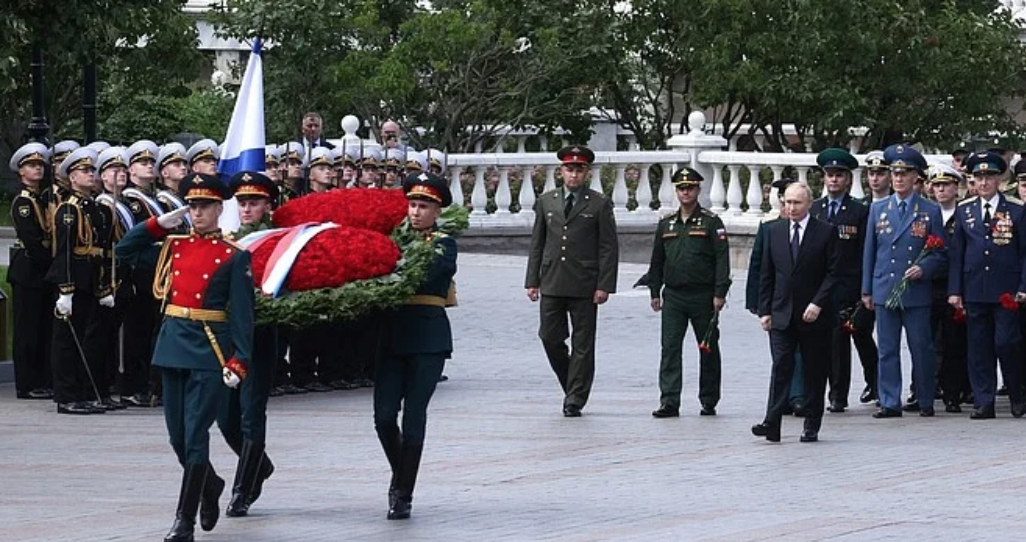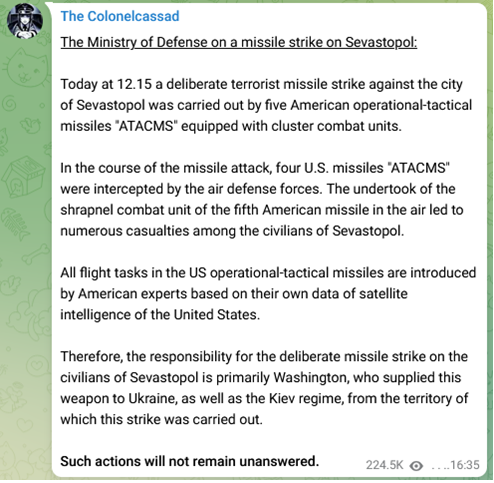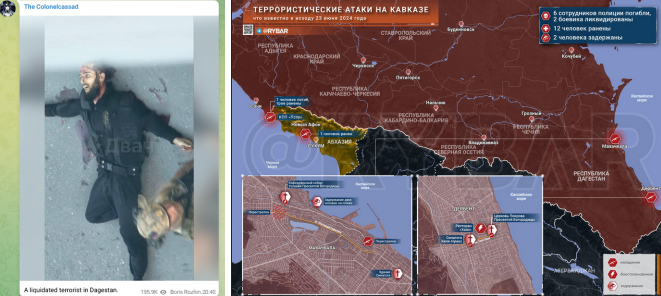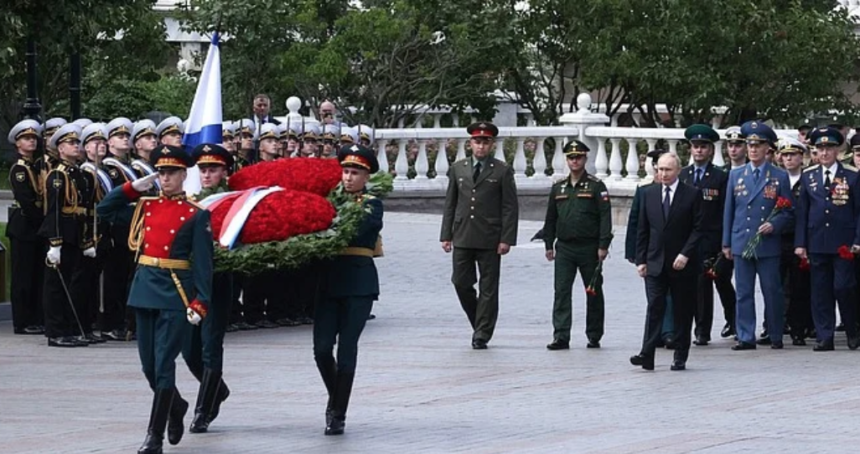Yves here. Helmer’s latest post gives a new chapter in the unhappiness of the Russian general staff and influential military bloggers with Putin’s measured pace in prosecuting the war in Ukraine.
Perhaps I am begin parochial, but I find the objections to be odd. Admittedly, the Communists and many of the very active military commentators are extremely hawkish, and get super upset about any Russian failing or even missed opportunity to be aggressive. That extends as far as, for instance, getting in an uproar in 2022 when Zelensky visited Kherson at the failure to assassinate him. While criticism of mistakes and setbacks can be salutary when that leads to post-mortems and corrective action, this cohort seems as a whole to see the war through the lens of a belief that maximalist aggressive action now would produce the best outcomes. But that course of action would lead to higher death counts, including among Russian civilians. More forceful offense now, before Ukraine’s and NATO’s forces are exhausted, risks more strikes, including in largely civilian areas. If the current upset is about deaths to civilians in Crimea, why provoke even more of the same?
Now it may be possible for Russia to make a highly concentrated series of strikes on Western surveillance assets in the Black Sea area, doing enough damage to deliver a decisive setback. But Helmer’s sources don’t seem to articulate much of a strategy for a counter-strike in the area, beyond the desire to show that Russia can and will retaliate.
Russia is winning the war and none of these attacks are significant enough to change that trajectory. If there is a change in their impact, or a marked falloff in support for the war in the Russian public, that would merit a change in posture. But Russia has been very disciplined in not letting provocations, no matter how upsetting they might be in the near term, from getting them to change their course of action, beyond accelerating what Russia had underway (destruction of the Ukraine electrical grid) or making specific changes meant to address specific problems (moving troops into Kharkiv oblast to create a buffer zone and reduce strikes into Russia as well as threatening escalation in entirely different theaters in response to the US and NATO playing direct role in attacks on pre-2014 Russia).
Now the milbloggers may believe, and may even be correct, that hitting US and NATO air assets operating over the Black Sea is an appropriately calibrated and effective response. But I don’t see them unpack why. It seems to be assumed as opposed to substantiated.
And in the meantime, Russia designating the operation as terrorism, which the hawks seem to view as cowardly, gives Russia leeway in terms of what to do next. After all, they can even claim that based on further investigation, it was an act of war. Helmer does explain the importance to the Kremlin to keeping the conflict within the Special Military Operation framework…which still gives Russia a lot of room for maneuver. Remember, having Russia be able to depict itself as responding to Western escalation is also a better path in terms of keeping the backing of important allies like China (and less officially, Turkiye and India) even as the US/NATO allies keep increasing sanctions on them.
The Dagestan attacks, even though smelling to high heaven of US or UK instigation or at least big-time help, much like the Crocus music theater attack, is still on its surface a terrorist operation. But even though Western officials have repeatedly denied any direct role in the Chechen war, successful Chechen separatism would have started to splinter Russia, with other Muslim regions like Dagestan next on the list. And even now, belligerent US officials talk up the need to break up Russia. Note that the staunch US allies, the Saudis, backed the Chechens. The State Department in 2002 said it was “engaged on Chechnya” through humanitarian and diplomatic efforts”. Why pray tell was the US meddling in a foreign civil war? In other words, even if Putin’s position on the Chechen wars may be depicted as paranoid, as the saying goes, “Just because you are paranoid does not mean that they are not out to get you.”
So Russia needs to at least look like it has made a serious investigation before it treats it otherwise, not just for political reasons but also so as to target the proper perps.
By John Helmer, the longest continuously serving foreign correspondent in Russia, and the only western journalist to direct his own bureau independent of single national or commercial ties. Helmer has also been a professor of political science, and an advisor to government heads in Greece, the United States, and Asia. He is the first and only member of a US presidential administration (Jimmy Carter) to establish himself in Russia. Originally published at Dances with Bears

The Ukrainian missile attacks on Sevastopol on Sunday afternoon – five US ATACMS missiles with cluster-bomb warheads – have drawn the most explicit reaction yet from Russia’s independent military bloggers, followed in four hours by an official communiqué from the Defense Ministry. The Kremlin communiqué which followed the Defense Ministry an hour later as Sunday evening came on, was not the same.
A salvo of five ATACMS (Army Tactical Missile System) missiles was intercepted over the Uchkuevka beach at Sevastopol just after midday. In celebration of the 30-degree sunshine and the Orthodox Trinity holiday, there were a large number of people in the water and on the sand. The missiles were intercepted in the air, but shrapnel from the detonating warheads struck the beach. At latest count, four people were killed, two of them children; 151 people, including 27 children, were wounded; 82 were hospitalized, 13 of them in serious condition.
Boris Rozhin, editor in chief of the Colonel Cassad military blog, was in Sevastopol and he reported from one of the hospitals to which the casualties were taken. His reports started at 12:23 local time and continued for almost twelve hours.
Rozhin is one of the independent Russian war correspondents calling on the Kremlin to remove the limit which has been placed on attacking the US Air Force (USAF) drones and other NATO aircraft which operate over the Black Sea, in international waters off the Crimean shore, to provide flight course, evasion of Russian air defence units, and target coordinates to the American and Ukrainian ground crews operating the ATACMS batteries and executing the fire orders.
Russian reports indicate the launch point for the Sevastopol beach attack was Nikolaev on the Ukrainian mainland. If so, the range of the missiles was at least 300 kilometres – longer than the US has publicly admitted. This also means that to be effective in defence against the repetition of such attacks against civilians, the proposed Russian demilitarized zone for the Ukraine, or “sanitary zone” as Putin has called it, must stretch from Nikolaev westward to Kiev.
Rozhin has blamed the US explicitly in language repeated by other military bloggers. They mean to say, as they have been repeating in recent weeks, that the USAF drones used in the Sevastopol attacks should be destroyed.
Just after 1600 Moscow time on Sunday, the Russian Defense Ministry issued its bulletin. The text, auto- translated into English, reads:
Note that that the Ministry, and the General Staff behind it, target the US as directly engaged in the operation of the missile attack. However, they start by calling the attack a “terrorist” strike, not an act of war. The wording of the statement also avoids identifying the USAF drones and other airborne electronic warfare systems offshore from Crimea. Instead, it refers to “satellite intelligence”.
These are ideological references, not military ones. The distinction between Ukrainian acts of terrorism and war is Kremlin policy. By terming such attacks, including the Crocus City Hall attack in Moscow in March, terrorism but not war, the policy follows that the Special Military Operation is not in fact a war, and that Russian war tactics and strategy should be limited to retaliation, not to the defeat and demilitarization of the US and NATO on the Ukrainian battlefield.
At 1715 the Kremlin followed with a communiqué headlined: “The President reached out to the Government’s social bloc and the military following the attack by the Ukrainian Armed Forces against Sevastopol.” The two-paragraph statement said: “Vladimir Putin has been in touch with senior officials from the Government’s social ministries and agencies and healthcare institutions on an ongoing basis considering the urgency of providing care to the attack victims. The President has also been interacting with the military. The Ukrainian Armed Forces targeted Sevastopol with an intentional missile strike in the afternoon of June 23, using five ATACMS US-made tactical missiles. The attack left at least 124 people wounded or injured, to a varying degree of severity, including 27 children.”
The president’s statement was issued from the Kremlin in Moscow. Putin, who had returned from his visit to North Korea and Vietnam on June 20, has remained in the Moscow area.
As he prepared to leave Vietnam on June 20, Putin was asked by a Kremlin pool reporter from Kommersant what he has meant by his threats to attack the US and NATO sources of the Ukrainian missile and drone attacks on Russian targets in Crimea, the Donbass, and the hinterland regions. “Andrei Kolesnikov: Kommersant newspaper, Andrei Kolesnikov. Can the use of Western long-range weapons be viewed as an act of aggression? Overall, can the shelling of Belgorod and Russian territory in general be viewed as an act of aggression? Vladimir Putin: This matter requires further investigation, but it is close. We are looking into it. What are we dealing with in this case? Those who supply these weapons believe that they are not at war with us. As I have already said, including in Pyongyang, we reserve the right to supply our weapons to other regions of the world. I would not rule out this possibility in terms of our agreements with the Democratic People’s Republic of Korea. We can also adopt the same position on the question of where these weapons end up. Take the West, for example. They supply weapons to Ukraine, saying: We are not in control here, so the way Ukraine uses them is none of our business. Why cannot we adopt the same position and say that we supply something to somebody but have no control over what happens afterwards? Let them think about it. Therefore, at this stage, our primary objective is to defend against these strikes.”
On June 22, Putin laid a wreath at the Tomb of the Unknown Soldier in Moscow (lead image). He then made a speech at the Kremlin to new graduates of the military and security service academies. Putin promised them more weapons and new technologies. “Let me emphasise that the effectiveness of the entire work to strengthen Russia’s defence capabilities directly depends on the officers – you and your colleagues. Soon you will lead military units and, I believe, make every effort to master advanced weapons and equipment, to perfectly train personnel, and you will also be a paragon of professionalism, discipline, decency, and personal courage for your fellow soldiers.”
The military distinction between the Sevastopol attack and those which followed in Makhachkala and Derbent, Dagestan, later in the day, when a synagogue, church, and police were attacked by a group of six Dagestani men has been obscured in the Russian reporting. All the attackers have been killed; eight Russian security forces and two civilians, one of them an Orthodox priest, have also died, and another 16 wounded.

Left: dead gunman in the street in Derbent, Dagestan, reported by Rozhin. Right, “Terrorist Attacks in the Caucasus”, summary report by Mikhail Zvinchuk of Rybar.
At the same time as the Dagestan events took place, Rozhin and other milbloggers were reporting a new Ukrainian air raid over Crimea. “The enemy shelled western Crimea. Air defence positions in the area of Yevpatoria were hit. The RQ-4 Global Hawk worked at sea as it usually does, in total safety. The chatter about the fact that they will be seriously interfered with remains just chatter at the moment” — posted at 23:22. https://t.me/s/boris_rozhin/
Mikhail Zvinchuk, who directs the Rybar military blog, reported just before midnight on Sunday: “The night before, according to some reports, up to 15 drones were observed in the western part of Crimea, some of which were shot down. Again, during the attack, an American RQ-4B drone was in the air, which again raises the question of the expediency of destroying Western aviation, which directs the AFU (Ukrainian Armed Forces) to Russian territories and residents.”
Dmitry Medvedev, the former president and now Deputy Secretary of the Security Council, was almost as clear. He issued this Telegram statement at 20:22 on Sunday evening: “Bastards from the United States supply rockets with a cluster charge to Bandera and help bring them to the target. Bastards in Kiev choose a beach with peaceful people as a target and press the button. Both will burn in hell. Hopefully, not only in the sacred fire, but even earlier, in the one on earth. All that happened was not military action, but a vile and heinous terrorist attack against our people, committed on an Orthodox holiday. As well as the massacre in Dagestan which was staged by extremists. Therefore, now all of them – the American authorities, the Bandera regime and the insane fanatics – are no different for us.”








